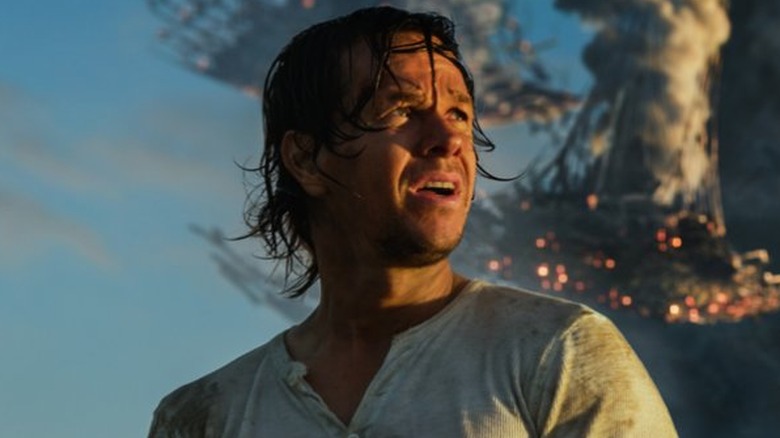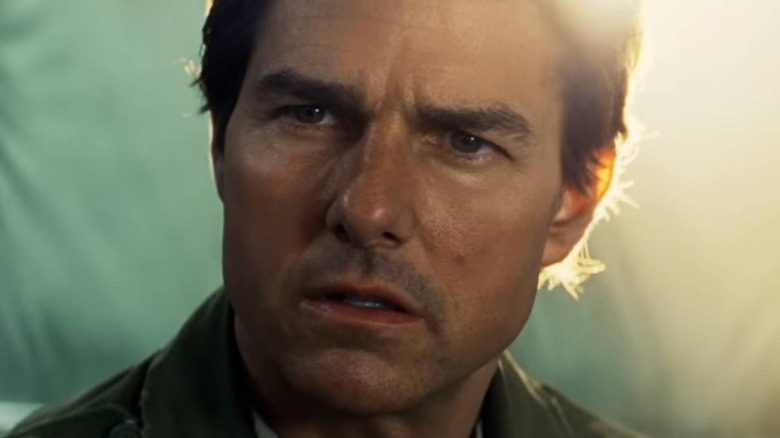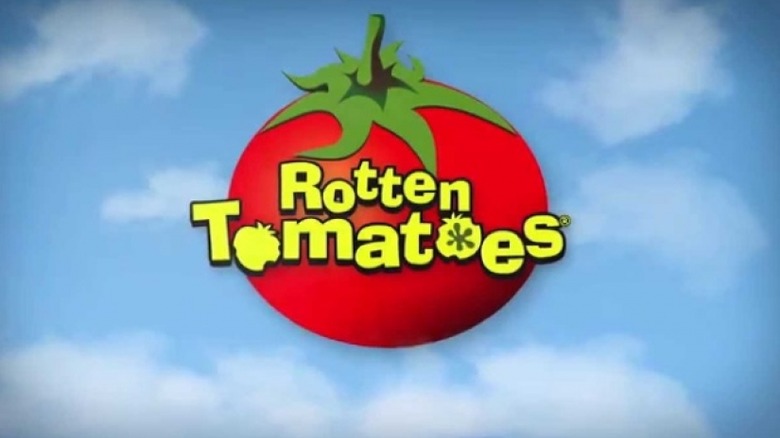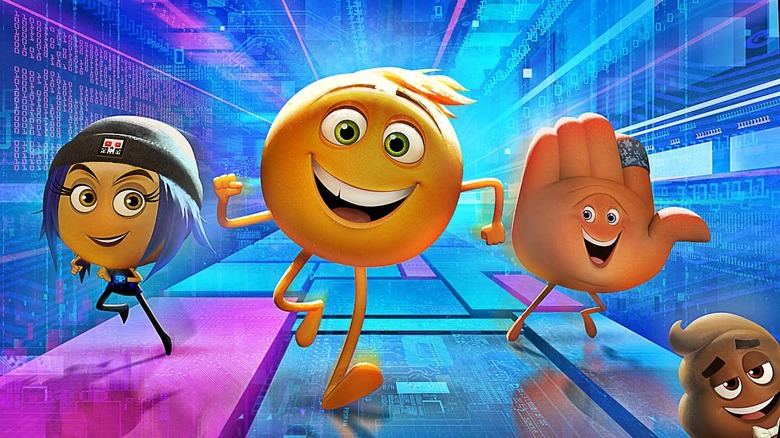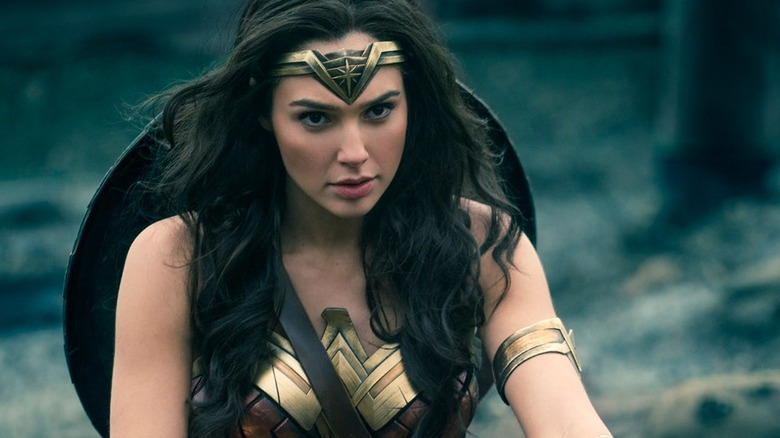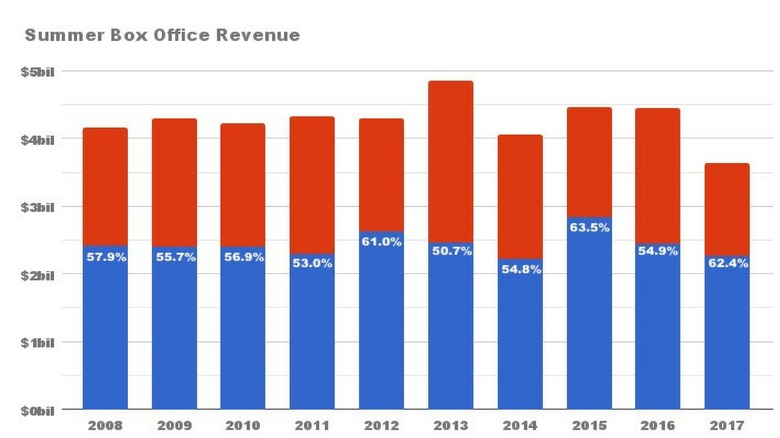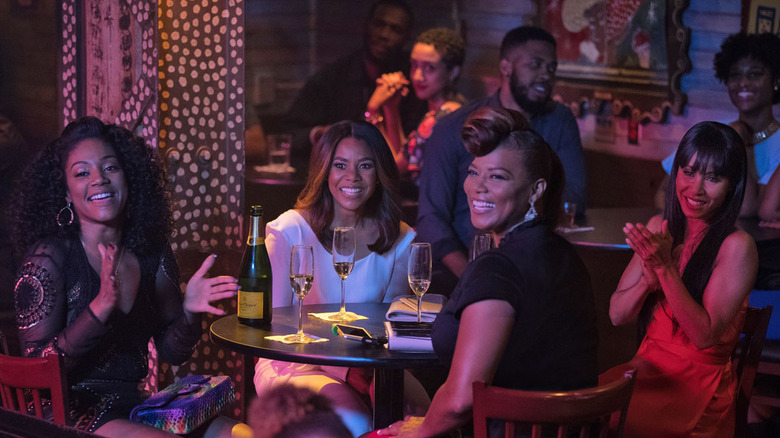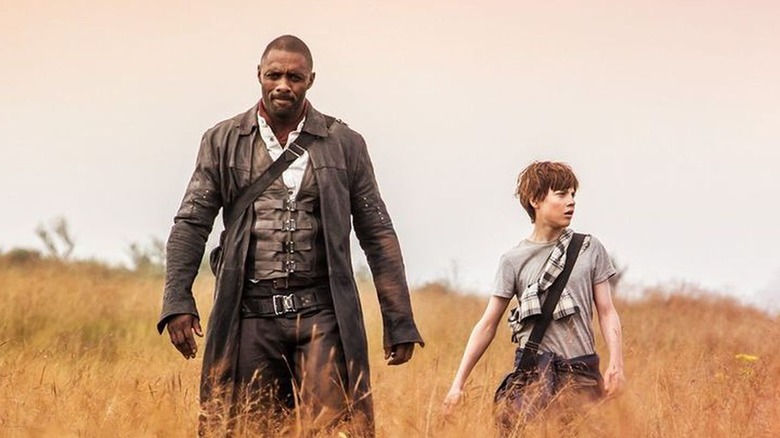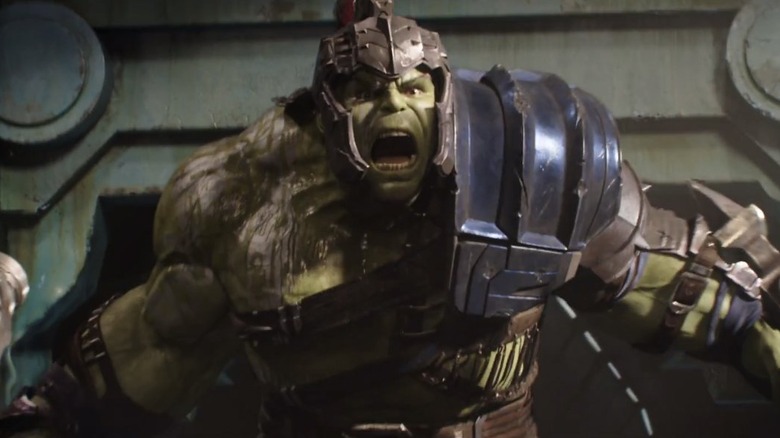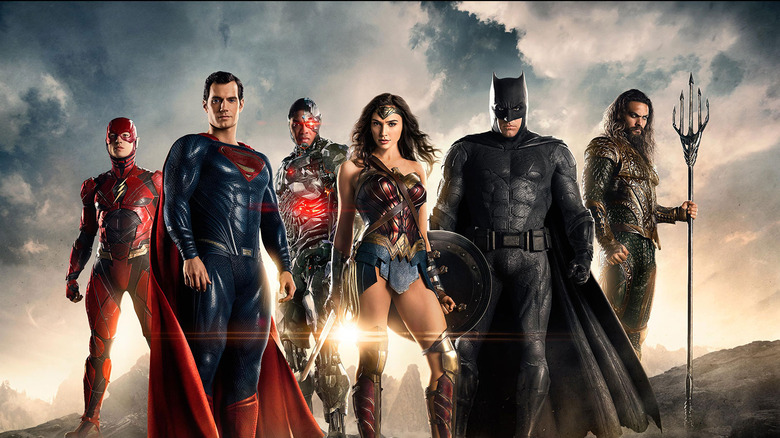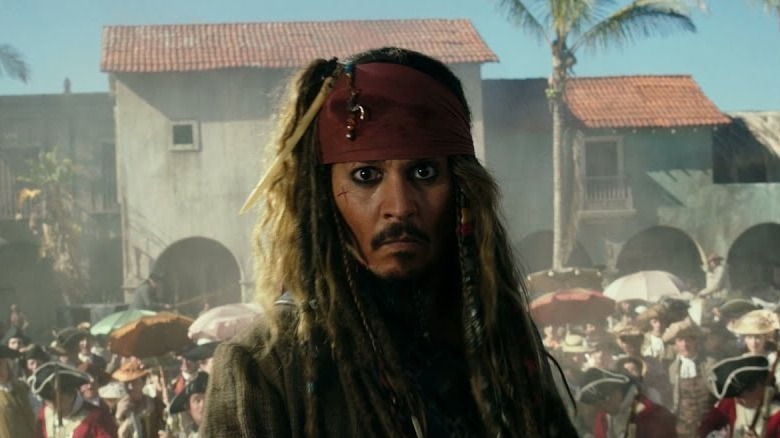The Real Reason The Summer Box Office Was Such A Disappointment
This summer wasn't exactly sunny for the movie industry. For the first time since 2006, the May to August box office failed to top $4 billion, with the total coming in just under $3.8 billion, down 15.7 percent from last year. This drop, the worst in modern history, is only compounded by the fact that the total number of tickets sold has fallen to a 25-year low.
While there have definitely been success stories this summer, an overwhelming number of would-be blockbusters have failed to find an audience domestically, leading to disappointing returns and an increasing scramble to figure out what, if anything, will work to draw in busy viewers. With Hollywood still trying to learn how to adapt to the modern era, let's take a look back at the summer box office and see what went wrong—and what lessons can be taken away for the future.
Hollywood relied too much on reboots and sequels
Faced with a fast-changing entertainment landscape, Hollywood has been increasingly turning to established properties for what should be surefire hits. While the strategy of reboots and sequels worked for a while, Hollywood's over-reliance on them seems to be turning away domestic audiences.
The latest Pirates of the Caribbean outing, Dead Men Tell No Tales, saw the lowest domestic opening of the franchise since the first film; the latest outing of the Transformers franchise, The Last Knight, did even worse, falling below the franchise opener, never a good sign for a sequel.
It wasn't just franchises that audiences were beginning to grow tired of. Universal's attempt at launching a Dark Universe with Tom Cruise's The Mummy was an epic fail, with fans of the original film and of the Brendan Fraser trilogy shunning the badly reviewed reboot. Guy Ritchie's try at freshening up the King Arthur tale with Legend of the Sword was also a failure, bringing in just $39.1 million domestic against a $175 million budget.
While there are definitely sequel and reboot success stories, such as Guardians of the Galaxy Vol. 2 and Spider-Man: Homecoming, an overwhelming amount of what should have been sure successes flopped after bad reviews and negative word of mouth. In the future, Hollywood execs may want to rethink their green-lighting strategy to ensure that reboots and sequels do audiences justice.
More quality entertainment options are coming to streaming sites
In past years, the big entertainment talk of the summer was usually surrounding big screen blockbusters. That is no longer the case. Buzzy new options are increasingly coming to television, cable, and streaming, allowing viewers to access quality entertainment without having to leave the comfort of their own homes.
Those options include huge shows like HBO's Game of Thrones, which broke viewership record after viewership record with its enormous seventh season, along with smaller but still popular entries like GLOW, The Defenders, and Orange is the New Black. There's also an increasing number of movies coming to streamers, with comedies coming through Adam Sandler's deal with Netflix, along with popular documentaries like Icarus and genre programming like What Happened to Monday and Little Evil. On top of that, events like the Conor Mayweather-Floyd McGregor fight took away viewers from theaters.
With home entertainment options becoming increasingly available, it can take a special film to really sell the value of the theatrical experience. While some movies, like Christopher Nolan's Dunkirk, were able to convince audiences that the big screen was necessary for full enjoyment, most weren't able to draw viewers away from their television screens.
Ticket prices hit a record high
Compounding the fact that streaming options are becoming increasingly more available is the fact that going to the movies is getting more and more expensive. Ticket prices in North America were the highest ever during the summer season, falling at an average of $8.95 each, according to the National Association of Theater Owners.
This $8.95 is up from the $8.84 average in the first quarter of the year, and seems even higher when compared against the $8.73 average in the summer of 2016. However, box office analysts do caution considering those prices against the past, noting that, when adjusting for inflation, years like 1977 saw average ticket prices of $9.34. (The price was $2.23 before inflation.)
Still, though, rising ticket prices are an easy deterrent for audiences heading out to theaters. Add in the increasing price of concessions (as opposed to that microwave popcorn bag you already have in your kitchen) and it's easy to see why audiences may choose to stay home rather than head out to theaters.
Movie theaters haven't been innovating
In the spring, Netflix CEO Reed Hastings handed down a pretty strong condemnation of movie theaters, saying, "How did distribution innovate in the movie business in the last 30 years? Well, the popcorn tastes better, but that's about it." While his comments may be a little harsh, the theater industry's hesitance to move forward has put a bit of a damper on their ability to grab increasingly distracted audiences.
Some theaters are trying to combat this by searching for ways to reinvigorate the movie-going experience, mainly through renovations introducing recliners and other amenities into theaters. Some estimates say that by the end of the year, as many as 40 percent of theaters could include these fancier seating options. Many of those theaters are also beginning to serve higher end meal options and alcohol to draw audiences in for a more luxurious night out.
While these are good steps, most movie theaters remain standard fare, and audiences appear to be tiring of the same old thing. Theaters will have to really consider how to appeal to more audiences (especially to younger audiences) if they plan on remaining relevant in the fast changing entertainment landscape.
Audiences are relying more on Rotten Tomatoes scores
The influence of review aggregator site Rotten Tomatoes has become particularly prevalent since early 2016 when Fandango bought the company and started displaying scores next to movies as it was selling online tickets. Since then, bad scores have been increasingly correlated with box office flops.
The sudden ease of access to critical consensus has movie studios worried, especially considering how skewed Rotten Tomatoes scores can be. The outlet assigns mostly-negative reviews as rotten and mostly-positive reviews as fresh; however, this thumbs up/thumbs down system often leaves out middling opinions, which can lead to very low Rotten Tomatoes scores despite mostly moderate reviews.
The numbers are particularly being blamed in the case of Dwayne Johnson's Baywatch, which had a lot of early buzz but sank immediately after reviews were released. Data have also shown that Rotten Tomatoes has an increasing effect on young audiences. Some studios have even delayed press screenings until the day before or the day of release to save the negative press from getting out too quickly.
There are some notable exceptions to this, particularly Sony's The Emoji Movie, which topped the box office despite a dismal seven percent on the platform. There are also movies that have extremely high scores, like Logan Lucky and War for the Planet of the Apes, that have been disappointments at the box office. While are there exceptions, it seems like review aggregators have a big role to play in Hollywood's future.
Hollywood is having a hard time drumming up organic buzz
With the increasing amount of entertainment options available, word of mouth has become more important. We no longer live in a world where audiences head out to theaters because that's the only thing to do on a Friday night; now, there are plenty of other options, and studios have had to find a way to get viewers talking and get them interested in their tentpoles.
This summer, that seems to have been a tough task. Almost every movie that has flopped thus far has had trouble drumming up buzz on social media, with data showing that audiences were more interested in talking about its competitors or about films due even later out in the year.
Even worse, some movies have been plagued by entirely negative buzz, which can be spurred on by bad reviews. While some movies, like The Emoji Movie, are able to move past this online panning and still draw people in at the box office, others are crushed before they get the chance to take off. While it's tough to find a way to get audiences to respond to something when they are uninterested, finding a way to spur on word of mouth both in person and online will be important in box office success in the future.
There were more misses than hits
When you're presented with the disappointing statistics about this summer's box office, it's easy to be confused. There were quite a few hits this summer, including some movies that surpassed initial expectations for huge box office hauls. Wonder Woman blew away her competitors to become the highest domestic grossing DCEU film to date, despite having the smallest opening; Christopher Nolan's Dunkirk capitalized on strong buzz and word of mouth to provide the director one of his biggest non-Batman openings ever; and Girls Trip showed once again that Hollywood needs to stop underestimating minorities by grossing over $100 million.
While there were quite a few successes in the mix, the fact of the matter is that the failures far outweighed the winners. This summer saw huge disappointments in movies like King Arthur: Legend of the Sword, Baywatch, Transformers: The Last Knight, and more, along with mediocre performances from movies like Pirates of the Caribbean: Dead Men Tell No Tales and Alien: Covenant. While the talk of the town was some of the big hits, the box office was really pulled down by the large number of movies that performed under expectations.
The same films carried most of the weight
If you followed the box office throughout the summer, you may have seen that there were a number of consistent performers, with the likes of Wonder Woman and Guardians of the Galaxy Vol. 2 sticking around the top of the charts for weeks after their release. While this is common for big movies, 2017 was particularly heavy on the same films bringing in most of the profit, picking up the slack for a lot of under-performers.
This summer, 62.4 percent of the revenue came from those top 10 films, as shown above. This is significantly up from last year, where only 54.9 percent of the total revenue came from those top earners. On average, the past ten years saw about 57.1 percent of their total box office revenue coming from those top 10 movies. This year was the second highest of the past ten years, falling only below 2015, where Jurassic World and Avengers: Age of Ultron pushed the top ten to 63.5 percent of the total share. The only other summer to top 60 percent was 2012, with Avengers and The Dark Knight Rises pushing the top ten to 61 percent.
Contrary to those two years, 2017 didn't see many massive earners. The top grosser was Wonder Woman, which came nowhere near the high grosses of those other two years. The year also only saw 11 films earn more than $100 million, the lowest number of the past decade.
Audiences showed less love to R-rated comedies
The R-rated comedy has long been a summer staple, but it may be losing its prestige in Hollywood. Of the five big R-rated comedies released this summer, only one can be counted as a success—Girls Trip, the only comedy of the year so far to top $100 million at the domestic box office. The rest of Hollywood's attempts at drawing in audiences with raunchy fun this summer—Snatched, Baywatch, Rough Night, and The House—were all either failures or disappointments, despite the big name stars attached.
Girls Trip was the only one of those five to earn that coveted fresh rating on Rotten Tomatoes, something which, as we mentioned, is becoming important in box office success. Audiences also may be turning away from the R-rated comedy because they can get their share of people behaving badly in other genres. While the R-rated comedy used to offer a certain amount of shock value, that same surprise and subversion can now be seen in movies like Get Out and Deadpool. Comedies are also becoming favorites of streaming platforms, with classics hosted online and new movies from the likes of Adam Sandler frequently hitting the Internet as well.
While original ideas, diverse casts, and good reviews can still make an R-rated comedy a success story, audiences appear to be turning on one of Hollywood's more reliable genres—something which is sure to have an impact on what earns the green light in the future.
August didn't have a tentpole
Last August saw a record breaking opening for DC's Suicide Squad, which currently holds the title for the biggest opening for the month with $133.6 million. Two years before that saw a nearly $100 million opening for Guardians of the Galaxy; other recent years have seen the releases of films like The Bourne Legacy, Straight Outta Compton, and Teenage Mutant Ninja Turtles. This year, early August was left bereft of a tentpole film. While Sony attempted to make one out of Stephen King's The Dark Tower, the badly reviewed film's lack of marketing and organic buzz made it DOA, sending what should have been a blockbuster quickly to the bottom of the charts.
While Samuel L. Jackson and Ryan Reynolds' action comedy The Hitman's Bodyguard and the horror flick Annabelle: Creation have been able to drum up some business in the slow month, the lack of a tentpole meant that August was a sad capper to an already bummer summer. Couple that with a Labor Day weekend with no new wide releases and you wind up with a final month poised to pull already depressing statistics down even further.
Hollywood has been rethinking their release schedule
Summer used to be blockbuster season. With people going on vacation and kids out of school, conventional wisdom said that that May to August period was the time to draw audiences to theaters (and air conditioning). In fact, the season used to account for almost half of the total yearly box office. However, in the last five years, that has changed drastically. As they cope with changing audience demands, Hollywood has begun to spread out their release schedule more, putting huge blockbusters like this year's upcoming It, Thor: Ragnarok, and Justice League in non-summer and non-holiday months in an effort to grab more viewers.
This can be shown through 2016, a record breaking year at the box office. 2016's summer was not the best showing for Hollywood, but the four month period still managed to outpace almost everything that had come before and brought huge hits like Captain America: Civil War and The Secret Life of Pets. However, that time still only accounted for 39 percent of the total yearly box office. This change is part of the reason why not everyone in Hollywood is stressing about the bummer summer; there's still a lot of time to bounce back.
There's still hope for this year
Before the dismal summer, 2017 was doing fairly well with the domestic box office up almost four percent from 2016 due to huge hits like Beauty and the Beast, Logan, and The Fate of the Furious. And there's plenty of signs of good things to come.
One of those things could be Stephen King's IT, which is tracking for a potentially record-breaking opening in early September. The horror flick already has a lot of buzz, with its teaser trailer earning the most views ever in a 24 hour period, and critics have said that it seems absolutely terrifying. The movie is tracking for what could be the biggest September opening of all time.
IT isn't alone in September, either. The month will also see the releases of Kingsman: The Golden Circle and The LEGO Ninjago Movie, both of which could open to more than $40 million. Three openings of this size has never before happened in September, and that could be just the start to an impressive fall box office that also includes Justice League, Thor: Ragnarok, and Blade Runner 2049. Plus, with another Star Wars movie hitting theaters in December, there is still quite a lot of time for the box office to be booming again.
There's always the international box office
For flop after flop this summer, the international box office has been a savior. Movies like Pirates of the Caribbean: Dead Men Tell No Tales, Transformers: The Last Knight, and The Mummy failed to find audiences stateside but were able to make that up and then some overseas. While other domestic flops like Luc Besson's Valerian and the City of a Thousand Planets weren't that lucky, they still saw bigger returns with foreign markets than at home.
This has brought some welcome good news for Hollywood. While the domestic summer box office is down significantly, the international box office is up more than three percent for the year to date. The international box office has also shown to be friendlier to familiar franchises and has been a lot more review-proof than at home.
While the international box office has provided a savior for many a movie, Hollywood is still looking for a way to connect with audiences at home, where they are able to bring in the highest profits. How, exactly, they can do that, though, remains to be seen.
